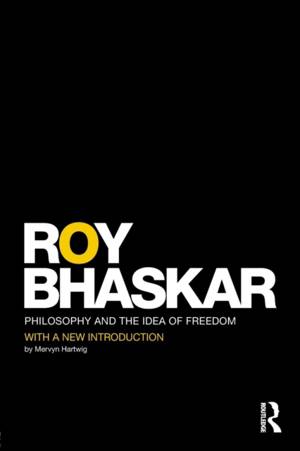
Bedankt voor het vertrouwen het afgelopen jaar! Om jou te bedanken bieden we GRATIS verzending (in België) aan op alles gedurende de hele maand januari.
- Afhalen na 1 uur in een winkel met voorraad
- Gratis thuislevering in België vanaf € 30
- Ruim aanbod met 7 miljoen producten
Bedankt voor het vertrouwen het afgelopen jaar! Om jou te bedanken bieden we GRATIS verzending (in België) aan op alles gedurende de hele maand januari.
- Afhalen na 1 uur in een winkel met voorraad
- Gratis thuislevering in België vanaf € 30
- Ruim aanbod met 7 miljoen producten
Zoeken
Omschrijving
First published in 2011. In Philosophy and the Idea of Freedom Roy Bhaskar sets out to develop a critique of the work of Richard Rorty, who must be one of the most in?uential authors of recent decades. In a brilliant tour de force, Bhaskar shows how Rorty falls victim to the very epistemological problematic Rorty himself describes. Roy Bhaskar argues that Rorty's account of science and knowledge is based on a half-truth. He sees the historicity of knowledge but cannot sustain its rationality or the reality of the objects it describes. The author further argues that Rorty's problem-?eld replicates the Kantian resolution of the third antinomy: we are determined as material bodies, but free as discursive (speaking and writing) subjects. Rorty's actualism (like Kant's) makes human agency impossible. Developing his own critical realism, Bhaskar shows just where Rorty's system comes unstuck, and how the philosophical problems to which it gives rise can be rationally resolved and explained. In this process Bhaskar utilizes his critique of Rorty to begin to elaborate his own alternative interpretation and critique of the philosophical conversation of the West.
Specificaties
Betrokkenen
- Auteur(s):
- Uitgeverij:
Inhoud
- Aantal bladzijden:
- 240
- Taal:
- Engels
- Reeks:
Eigenschappen
- Productcode (EAN):
- 9780415579643
- Verschijningsdatum:
- 27/10/2010
- Uitvoering:
- Paperback
- Formaat:
- Trade paperback (VS)
- Afmetingen:
- 155 mm x 231 mm
- Gewicht:
- 362 g

Alleen bij Standaard Boekhandel
+ 180 punten op je klantenkaart van Standaard Boekhandel
Beoordelingen
We publiceren alleen reviews die voldoen aan de voorwaarden voor reviews. Bekijk onze voorwaarden voor reviews.









